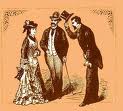By John Ramsey Miller
The Ramsey is back this week because I realized that although it may be pretentious, it is a vital part of my identity. Originally I put the Ramsey in because there were more than one John R. Millers scribbling. It is my actual name, even though the census bureau only wants the R, and has deemed the Ramsey irrelevant to existing in the rolls.
I’ve spent the past week learning to be a census taker, or an enumerator, and it’s been an eye opener. The idea of going up to a house and knocking on a door where I am not expected runs against my nature, and not necessarily being welcome to be on the front porch amazing. If you have never been told to “Get the F*ck off my property and don’t come back!” you are missing some real life up close. I took an oath and am fully capable of keeping your deepest secrets or I could go to prison for six years and be fined $250,000.00. So, although I love gossip, I’m not telling anybody anything that is PII (Personally Identifiable Information), or regarded as a “State Secret, or (as we say in the trade) a High Secret of the Federal Gov’ment.
I’ll say this about the Census Bureau, my class was comprised of people from all walks of life, some of which are working more than one job. Nicest bunch of people you’ll ever meet outside a writer’s conference. I’m not a best selling author doing research or looking to supplement my vast income from sales of my books, I’m another co-cog in the wheel and I like that.
I need to be knocking on doors and meeting people and running from dogs, and being rejected because I am a federal agent for a meddlesome government. I have awesome powers. “No Trespassing” signs do not apply to me and this is something the owners of the property often object to. The other day I went to an isolated location to pick up some old fencing for my chickens and the owners of the property had to walk down to a gate just like the one on the border of a small country. When they arrived I told them as a census worker I could have entered and he said, “That’s what guns are for.” And he meant it, or so you’d think is you didn’t know him, which I didn’t. After three shots of Ancient Age after loading the fence segments on my trailer, I told him, “You don’t have to cooperate with the census. This is America. Even though it is in the Constitution and serves purposes too numerous to mention, you can tell them to f*ck off, or chase them to your gate with a gun. They “can” fine you $100.00 (probably never happen) but they’ll have to come back and keep trying. But privacy is your right. And they probably won’t fine you. Do this for me,” I said. “Put a sign by the fence that says, “Census workers. There are two of us living back here in a cabin with two dogs and a cat. We don’t allow anybody on our property uninvited, which there is a mortgage on. I will tell you that there were two of us (a married couple) that were living here on April 1, 2010 and nothing else is any of your business. I’m crusty and my wife lets me be.” He agreed to do that.
The truth is most people who say, “get off my property” are good people. My fence buddy certainly is, but he is suspicious of the government and with good reason. I feel the same way about the government I have been watching for the past forty years. But I also know that the census is a good thing. I do believe that the information that links named people with a place in time is a great historical record (The PII records are sealed for 72 years), and the statistics are available to corporations looking for a factory location, an office, and so forth. The government uses the stats to bend and twist to justify this or deny that. Not my job to worry about that, but my right to worry if I like.
So for the next four weeks or so I’m not an author. I’m off today to run a rural route out in the county and knock on doors, and help gather information and not as an author, but as a strange man at the door asking impertinent questions. I’m sure I’ll have all the research for writing about door-to-dooring I’ll ever need.
So, guys and gals, when someone knocks on your door and asks to fill out a form because you didn’t mail it back in time, or fill it out, think of he or she as me, and smile and agree or refuse, but remember that person is somone’s son or daughter father or grandfather or whatever and be nice. believe me it matters.





